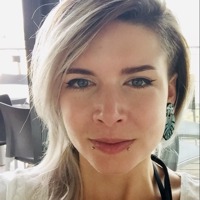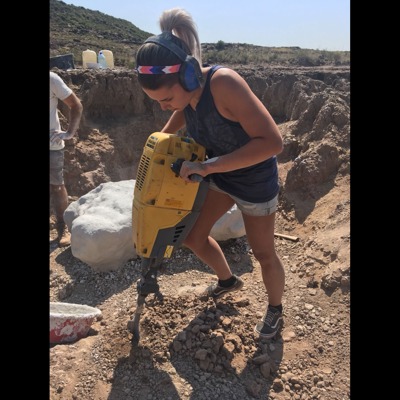
Marie-Claire Koschowitz
PhD Student at University of Oxford
I would tell you to do get a degree in an area of research you find truly interesting, then take the classes that you find interesting. Even though they might just be degree adjacent. If you want to come up with new ideas and make a name for yourself, you won't get anywhere if your heart isn't fully in it. I would also advise to have a rough plan where you want to end up at, so that you can identify and choose between opportunities that might get you closer to where you want to be. It's hard to reach your goal if you don't know what your goal is. If you figure out that you really don't like your goal as much as you thought you would, while doing the things necessary to get there, it is okay to re-evaluate and abandon ship. Sometimes we like the idea of a job, but actually doing the job is nothing like what we imagined and just not for us. That's okay. I always wanted to be a dinosaur scientist, but when I looked up the palaeontology curriculum it was mostly geology, ammonite shells and invertebrates. I would have not succeeded going there, because what I am interested in is animal anatomy and behaviour, specifically of reptiles. So I did a biology degree instead, wrote my undergrad thesis on the evolutionary transition from dinosaurs to birds and used that as a springboard to get a PhD project that deals with the evolution of eggs in dinosaurs and birds. Now I am a dinosaur scientist. I think what I am trying to say to you is 'All roads lead to Rome, if Rome is where you want to be. Go and find your road girl!'
About Marie-Claire...
Who am I?
"I can go where my interests take me and run wild with inventive and new approaches to complex questions, so my Investigator is great for this type of thing. My Campaigner also helps to be persistent, persuasive and humorous to get senior researchers to listen to my ideas and find solutions to access museum specimen or lab resources. I think I am a pretty decent researcher; my Innovator helps a lot here as I can make a lot out of limited resources and stay on track by finding efficient ways to get the most work done in a the smallest required amount of time. I am very grateful and privileged to have ended up in a niche on the job market that suits my personality traits so well. I think I'd be utterly miserable as a bank manager."
What do I do?
"I'm an evolutionary biologist and PhD student at the University of Oxford. My main interests are comparative animal physiology and big picture evolutionary questions such as Why do birds lay eggs? or How come dinosaurs grew fancy feathers and plumage before they could fly? I am genuinely curious about why animals look and behave the way they do and dinosaurs and birds were always my favourite animals, so it was natural for me to pursue academic degrees and become a scientists. Outcomes of my work are an increased understanding of evolutionary processes and have been published in academic journals like Science. In addition, dinosaurs and evolutionary theory is a great vehicle to keep the public engaged and interested in science, something that I try to foster by doing outreach for my departments and the Oxford University Museum of Natural History. So another direct outcome of my work is that it creates a tangible connection between research funding and the value of scholarship in the public eye, because I do interesting stuff that the public tend to find fascinating. I really love the freedom to decide my own office time and to work on my own schedule, as long as I deliver the required results and my PhD research stays on track. Being able to travel to conferences or to remote non-touristy locations is another great perk of being a biologist. For example, this September I spent two weeks digging in a dinosaur bone bed in a very rural area of South Africa. It was a great opportunity academically speaking, but I also got to experience the local village and community in ways that go far beyond what I would have seen on a regular safari holiday. I am in my final year and currently apply for post-doctoral research positions and Junior Research Fellowships. I aim to get my own lab-group and hopefully a lecturer- or professorship in the future."
How did I get here?
"Lara Croft and Buffy the Vampire Slayer inspired me. I’m not kidding! My parents were great role models and I adopted a lot of their societal and work ethics. But true inspiration came from those media representations of kick-ass women who were self-reliant and in the case of Lara Croft, highly educated. It took me to my late 20s to realise that the role models who I found so inspirational as a child and teenager were just fantasy depictions: which is actually quite sad. It would have been nice to have some exposure to real life female role models, to see that what I wanted out of life can be a reality instead of a fantasy."
The life I live
"I like to go running, play squash and cook and spend time with my friends. I also like to go to punk and indie music concerts and go camping at music festivals."
My typical day
"A typical day at work involves heading to the department at around 10am, getting a coffee and checking my emails. Afterwards I'll deal with the topic of the day which can range from writing my thesis, preparing slides for an upcoming talk at a seminar or outreach event, acquiring to reading literature online or in the library. There are always plenty of departmental seminars I can attend, for example on plate tectonics or how to track marine turtle migration. In the late afternoon I like to go for a run in the university park around the corner, or attend one of the exercise classes offered by various university sports societies. Afterwards I head back to the office and stay until 8pm or 10pm, to do some more writing or filing travel expense forms and other admin stuff. I am a night owl and I prefer to start my day later and stay longer in the office, unless I'm set to meet friends in the evening."
My qualifications
"German Abitur (Diploma) from a German grammar school, converts to AAA or ABB, I guess? It's hard to tell because to get a diploma that allows you to go to university, 13 years of grammar school are mandatory and the curriculum is more demanding than A-Levels in English grammar schools, I've been told. Undergraduate degree (BSc, BA, etc.) BSc in Biodiversity and Ecology, University of Göttingen "
Marie-Claire's Photos




